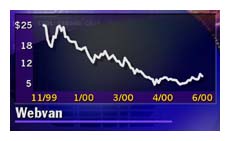|
Webvan goes shopping
|
 |
June 26, 2000: 5:21 p.m. ET
Online grocer pays $1.2B stock for rival HomeGrocer.com, extending reach
By Staff Writer Luisa Beltran
|
NEW YORK (CNNfn) - Webvan Group Inc. agreed Monday to acquire rival HomeGrocer.com Inc. in a stock swap valued at $1.2 billion, a move that will extend Webvan's reach to 13 metropolitan markets by the end of the year.
Under the deal, HomeGrocer.com shareholders will receive 1.07605 Webvan common shares for each share of Kirkland, Wash.-based HomeGrocer.com, the companies said in a statement. About 138 million Webvan shares will be traded for all currently outstanding shares of HomeGrocer.com (HOMG: Research, Estimates), giving HomeGrocer.com shareholders 28.3 percent of the combined company.
"Our focused efforts will help us target the majority of places where (our competitors) customers shop today - brick-and-mortar stores," Webvan Chief Executive George Shaheen told analysts in a conference call that was monitored by reporters.
The deal, based on Friday's closing price of $8.72 per share of Webvan stock, values HomeGrocer.com shares at $9.38, a 16 percent premium.
 Webvan Chief Financial Officer Bob Swan said the combined companies had $650 million in cash as of the end of May. The acquisition will save $20 million to $30 million in headquarter and marketing costs for 2001, he said. Webvan Chief Financial Officer Bob Swan said the combined companies had $650 million in cash as of the end of May. The acquisition will save $20 million to $30 million in headquarter and marketing costs for 2001, he said.
Combined sales in 2000 will hit $300 million-to-$325 million, Swan said, and $1.1 billion-to-$1.2 billion in 2001.
Shaheen declined to disclose if the deal would cause any layoffs but told analysts he "would look carefully at each position."
The boards of both companies have approved the merger. The deal is expected to close late in the third quarter or early in the fourth this year.
The combined company will operate under the name Webvan Group Inc. Foster City, Calif.-based Webvan (WBVN: Research, Estimates) operates in two markets � San Francisco and Atlanta. By the end of the year, the deal will boost its reach to include: Baltimore; Bergen County, N.J.; Chicago; Dallas; Los Angeles; Orange County, Calif.; Portland, Ore.; Sacramento, Calif.; San Diego; Seattle; and Washington, D.C.
Webvan founder Louis Borders will remain as chairman, while Shaheen will continue as president and CEO of the combined company.
However, the fate of HomeGrocer.com CEO Mary Alice Taylor was not disclosed. "I will assist in any way possible in the transition but George will be CEO," Taylor told analysts.
Goldman Sachs & Co. acted as Webvan's adviser on the deal, while Morgan Stanley Dean Witter assisted HomeGrocer.com.
Troubled online grocers
The online grocer sector � which includes Webvan, Peapod Inc. (PPOD: Research, Estimates), Streamline.com Inc. (SLNE: Research, Estimates)� and Pink Dot -- continues to face problems. In March, Peapod CEO Bill Malloy resigned prompting investors to pull $120 million in financing, seriously threatening the company's future. Since its initial public offering in November, Webvan shares have plummeted from their 52-week high of 34; shares continued to lose ground Monday, retreating 1-13/32 to close at 7-5/16.
HomeGrocer.com launched its IPO in March, hit a high of 16-1/4, but then lost ground. The company fell 1-7/32 to 6-7/8 Monday.
"None of them are making money," said analyst Mark Rowen, of Prudential Securities Inc., of online grocers. "Investors believe it is going to be difficult to make [the economic model] profitable."
Webvan had 87,000 registered customer by the end of first quarter that will grow to 264,000 because of the acquisition.
Webvan, which began delivering groceries in May 1999, continues to set its sights high. The company's long-term objectives include delivering food to 120,000 households within a 60 miles radius. The company plans to deliver orders within 30 minutes, averaging 4-to-6 deliveries an hours, with orders each averaging $103.
"Their model has a lot of hurdles that they need to leap to get it to work," Rowen said.
However, other analysts are more optimistic. Analyst Shawn Milne, of E*Offering, the investment bank of E*Trade, said Webvan's acquisition of HomeGrocer.com will reduce capital costs.
"The deal accelerates new market penetration and the combined companies won't be competing," he said.
Analyst Pete Swan, of Pacific Growth Equities, said Webvan differs from Peapod because it operates its own distribution center in Oakland, Calif., and plans to open two more in the next year.
"To get the full benefit from this the online grocer needs capital distribution," Swan said. "If they go through someone else they have to go through their specific cost structure and that gets added to costs."
For the year ended December 31, 1999, Webvan reported net sales of $13.3 million on net losses of $144.6 million, compared to no net sales on net losses of $12 million for the same time period in 1998. 
|
|
|
|
|
|
Homegrocer.com
Webvan
|
Note: Pages will open in a new browser window
External sites are not endorsed by CNNmoney
|
|
|
|
 |

|

